Educational Curriculum
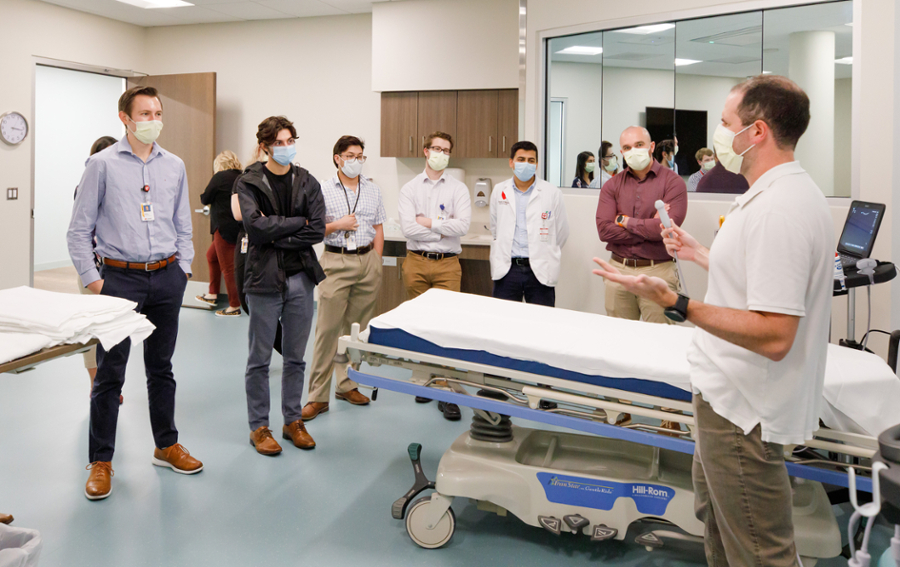
We provide a fellow-centered supportive learning environment that includes outpatient and inpatient clinical rotations, research opportunities, quality improvement projects and didactic experiences.
Our fellows work with our experienced faculty to deliver exceptional care to patients with kidney disease through UNMC's primary clinical partner, Nebraska Medicine.
UNMC Nephrology Fellowship Core Curriculum Didactic Series
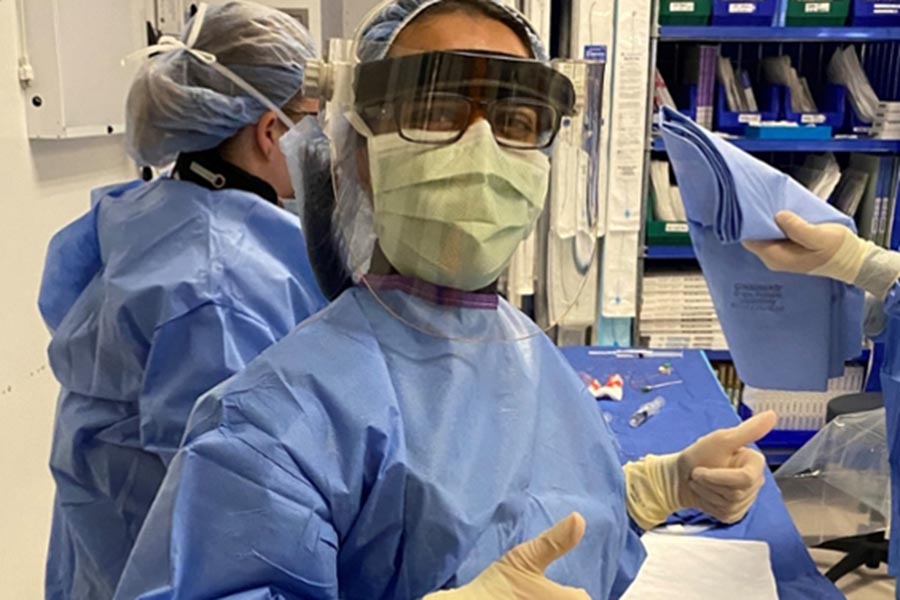
- CVC Insertion Simulation Lab
- Kidney Biopsy Workshop
- POCUS Workshops
- Interventional Nephrology
We have two interventional nephology faculty who supervise fellows in the interventional nephrology lab to develop skills across the spectrum of interventional nephrology including tunneled catheter insertion, endovascular procedures (e.g fistulagram, declot), percutaneous fistula creation, and PD catheter insertion. Fellows interested in Interventional Nephrology have ample opportunities to develop procedural skills, with several prior fellows achieving certification through the American Society of Diagnostic and Interventional Nephrology (ASDIN) during their two year fellowship, without having to do an additional year.
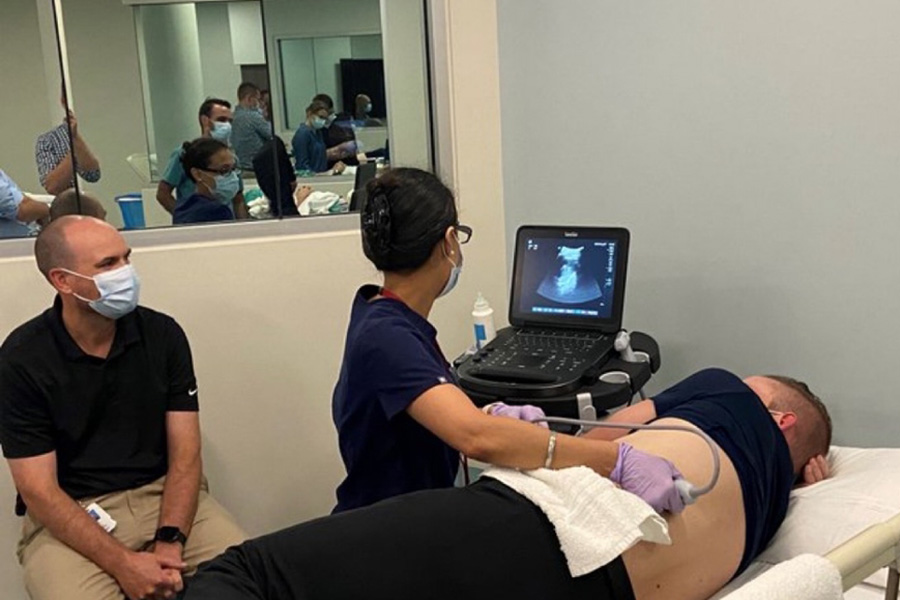
-
Kidney Potpourri
This is our case conferences held twice per month. Fellows and faculty present and discuss interesting recent cases
-
Renal-Rheum Conference
A multidisciplinary conference attended by faculty/fellows from nephrology, rheumatology and pathology. Here we discuss interesting cases that overlap with nephrology and rheumatology.
-
Journal Club
Clinical and basic science articles are presented by faculty and fellows at our monthly journal club, providing opportunity to debate the limitations and merits of the study, and its potential impact on clinical practice.
-
M&M Conference-QI Conference
Issues regarding patient safety and quality improvement are discussed in these sessions, including the experience of a mock Root Cause Analysis.
-
Board Review
Monthly sessions working through board-style questions in order to improve understanding of the material and gain familiarity with testable nephrology topics.
-
DDD Conference
Monthly pizza conference where fellows and faculty have open forum to discuss clinical conundrums or interesting clinical decisions.
-
NNN Conference (Nephrology Nuggets at Noon)
Noon lunch conference where fellows and faculty participate in nephrology trivia with the aim to review a spectrum of nephrology topics.
-
Internal Medicine and Nephrology Grand Rounds
Internal Medicine Grand Rounds take place on Fridays over the lunch hour. Topics are presented either by UNMC faculty or by invited outside faculty.
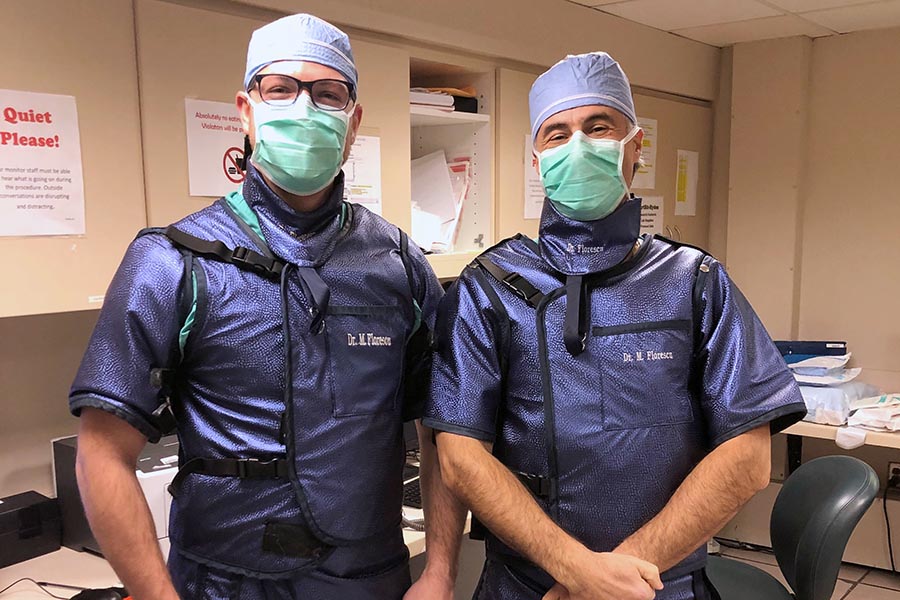
Fellows interested in research and/or quality improvement have the opportunity to develop, implement, present, and publish their work with mentored support from a nephrology faculty member. Our division has a wide range of clinical research interests including numerous actively enrolling clinical trials, as well as several registry and large database studies.
Elective time is provided to first year fellows to identify a research mentor and initiate project development. During the second year of fellowship, up to 6 months of elective time can be allotted for research. We provide support for fellows to participate in the UNMC Clinical Research Symposium. We hold monthly divisional nephrology research conferences which allow faculty and fellows to discuss ongoing or completed clinical or translational research.
Fellows consistently present their research at national meetings including the NKF Spring Clinicals, ASN Kidney Week, and the American Transplant Conference, and have a track record of successful peer-reviewed publications.
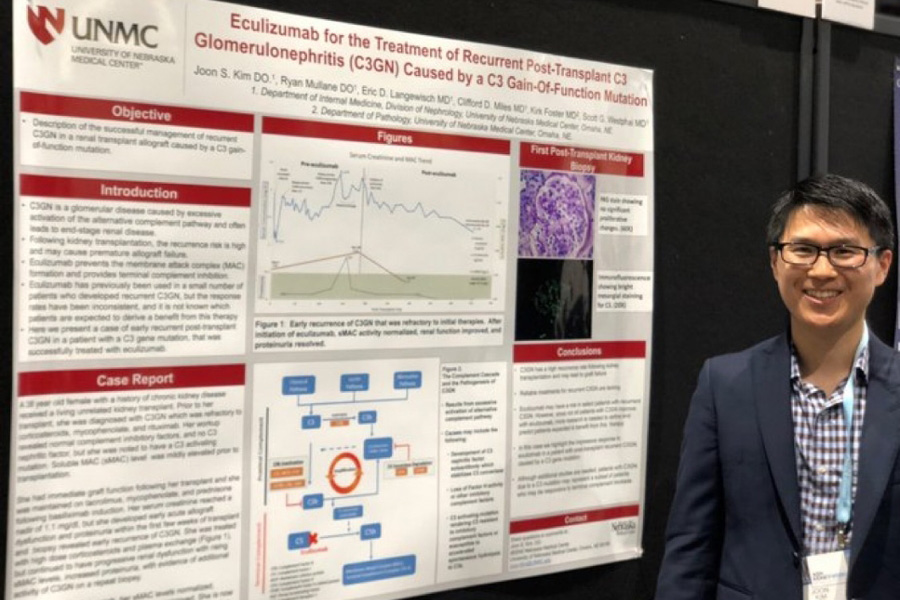
Core Curriculum Series
Block 1: New fellow core material
- Dialysis 1
- Dialysis 2
- Hyponatremia
- Intro to kidney transplant
- Intro to kidney pathology
- Acute kidney disorders
- Hepatorenal Syndrome
- Diabetic kidney disease
New fellow procedure workshops
- Urine microscopy
- Dialysis catheter insertion workshop (sim lab)
- Point-of-Care Ultrasound 1: Kidney
- Point-of-Care Ultrasound 2: Thoracic
- Point-of-Care Ultrasound 3: Cardiac
- Kidney Biopsy (minimally embalmed cadaver lab)
Block 2: End-stage kidney disease and dialysis therapies
- Dialysis 1 and 2 (intro block)
- Management of hemodialysis patients and complications
- Vascular access 1
- Vascular access 2
- PD prescriptions workshop
- Home Hemodialysis
- Water room and medical directorship
Block 3: Physiology and electrolytes
- Renal Hemodynamics and GFR
- Sodium/volume homeostasis
- Water Homeostasis
- Potassium regulation/disorders
- Ca, Phos, and Mag disorders
Block 4: ICU and consultative nephrology
- Hyponatremia (intro block)
- Acute kidney injury (intro block)
- Acid base disorders (intro block)
- Hepatorenal syndrome (intro block)
- Cardiorenal syndrome
- Continuous Renal Replacement Therapy
- Extracorporeal management of poisoning/intoxication
Block 5: Transplant nephrology
- Intro to kidney transplant (intro block)
- Transplant recipient evaluation
- Living kidney donation
- Organ allocation issues/policy
- Transplant immunology 1
- Transplant immunology 2
- Transplant infectious disease
- Transplant management and non-infectious complications
Block 6: Hypertension and Chronic Kidney Disease
- Hypertension 1
- Hypertension 2
- Chronic Kidney Disease, management and prevention
- Bone mineral and metabolic bone disease
- Diabetic kidney disease (intro block)
Block 7: Glomeruler diseases
- Intro to kidney pathology (intro block)
- Podocytopathies: FSGS and minimal change disease
- Membranous nephropathy
- Vasculitis and thrombotic microangiopathy
- MPGN and cryoglobulinemia
- Clinical approach to ANCA vasculitis and lupus nephritis
- IgA Nephropathy and other glomeruler diseases
Block 8: Special considerations
- Social determinants of kidney health and outcomes
- Geriatric Nephrology
- Palliative and end of life care in nephrology
- Nephrology in pregnancy
- Pediatric nephrology
Block 9: Miscellaneous
- Nephrolithiasis
- Onconephrology
- Hereditary kidney disorders
- Renal cystic disorders
- Plasmapheresis
- Imaging in nephrology
- Chronic interstitial tubulointerstitial diseases
- Private practice nephrology
- Biostatistics for the nephrologist
Apply to Our Program
Our fellowship program uses the Electronic Residency Application Service application process and participates in the match via NRMP. Please submit your application, letters of recommendation, and personal statement through the ERAS application.